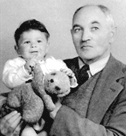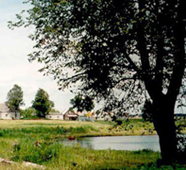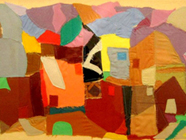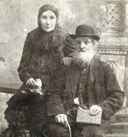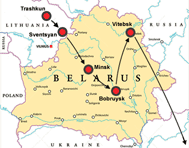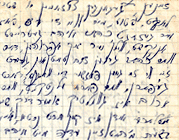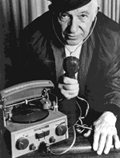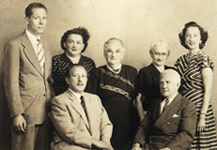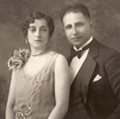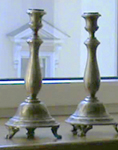Dov Ber Ichikovich married Chane-Golda Yuzent after the end of World War I. A few years later Dov Ber emigrated to South Africa, sending for his wife and young daughter as soon as he earned enough money. When their daughter Feyga grew up and had a family of her own, her Trashkuner parents had an important influence on her sons. Selwyn Bolel still cherishes the memories of his beloved bobe and zeyde. Here he recalls their time together and the stories they told him about their forebears and their own lives.
▼ Click panels for more info ▼
In Part I of his memoir, Berl Glezer leads us through prewar Trashkun, street by street, with recollections of his fellow Trashkuners and how they lived. In Part II, he describes life during the interwar period and the year of Soviet occupation, then recounts his perilous escape in June 1941. Berl recorded his memories decades after the war, at the urging of fellow survivors. He completed the memoir in July 1991, a half-century after the loss of his beloved shtetl.
Life before World War I: My Shtetele Trashkun, Part I ▶
Interwar period, World War II: My Shtetele Trashkun, Part II ▶
These are family stories shared by the descendants of Orel (Aharon) Itzikovich. Of Orel's 21 known grandchildren, only a handful were still living in Trashkun at the start of World War II. All the rest had emigrated, like many other Jews, before World War I to avoid being drafted into the czarist army, or after World War I to escape economic desperation. We now know that these departures were a blessing. While those who remained in Lithuania faced the threat of extinction, those who had fled proceeded to build new lives.
This charming portrayal of Avraham Elye Puner, whom the Jews of Trashkun nicknamed “Avraham der Got,” was written in 1988 by Itzhak Eliezer Konkurovich at the request of one of Reb Elye's descendants. But Konkurovich's letter is more than a description of one individual; it also tells us much about life in Trashkun before World War II. The letter was provided to Lewis Chilton by Bernard Margolis and published in Lewis Chilton's Family History Newsletter.
Zelda Yuzent was one of the five children of Nosn Yuzent and Dvora Glezer. Zelda's parents and all her siblings were killed in August 1941. Zelda alone survived by fleeing east into Russia as soon as war broke out. Many decades after the war, Zelda recounted that experience to her grandson, who took down her words and passed along the account. According to Zelda's cousin Misha Glezer, for the rest of her life, every night before she fell asleep, Zelda saw all her family members who perished in the Holocaust.
After the death of Shmuel Kovnovich in 1989, his daughter Sonia Kovnovich Mandel discovered among his papers an unfinished manuscript, a harrowing account of his escape from Trashkun at the outbreak of World War II. In these few pages are found intense moments of heartbreak and terror, but also moments of grace. The memoir has been translated from Yiddish by Sonia Kovnovich Mandel.
In 1965, the historian Dov Levin (1925-2016) recorded an oral history interview with Shmuel Kovnovich (1908-1989) and his wife Hasia (née Dlot) about their wartime experiences. Hasia fled Vilna in 1939, when Germany invaded Poland (Vilna was then part of Poland). Shmuel fled Trashkun in 1941, when Germany invaded Lithuania. Both eventually worked in a sugar factory in Uzbekistan. This transcript has been translated from Yiddish and edited for brevity. The Yiddish audio and a Yiddish transcript are also available.
Miriam Shumacher, daughter of Perl and Chaim Shumacher, was born in Trashkun and was a student in Kovno (Kaunas) when the war broke out in 1941. She spent most of the war in the Kovno ghetto. (Read how Miriam was rescued.) In three short videos from 1993, Miriam revisits Trashkun with her husband, fellow survivor Moshe (Morris) Krakinowski, and recounts what she learned in 1944 when she went back to Trashkun to find out what happened to her family.
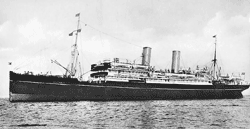
Chaim Daniel Reznikovich was born in Trashkun in 1906 and used the name Alter Resnik in the United States. In 1979, Alter was interviewed by Sam Puner (a first cousin) and Shirley Kalb (daughter of another first cousin). He spoke about his young years in Trashkun, his father, uncle and grandfather, the loss of his younger brother, and his journey to the US in 1923. The interview is part of the Bernard Margolis archive, kindly supplied by Jeff Meyerson.
Leybe Shepshelevich, Berl Glezer's uncle, was married to Chana Basya Glezer, Berl's father's sister. The Shepshelevich and Glezer families were close, and Berl kept in touch with them long after they had all left Trashkun and lived in far-flung parts of the world. At age 85, Berl had just arrived in Israel and was eager to reconnect with the descendants of his Shepshelevich cousins. He wrote these memories for their benefit. Berl's son Misha (Moshe) Glezer has translated the memoir from Yiddish to English with the help of his wife Yarit (Krakinowski) Glezer.
When Aaron Solomon married Esther Helen Selman in Boston in 1926, he wanted to show his new American wife the little shtetl in Lithuania where he had spent the first 20 years of his life. So for their honeymoon he took Esther to Troskunai. This is the diary that Esther kept during their visit with Aaron's family in Troskunai, including a few side trips to neighboring towns.
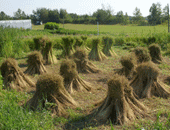
Berl Glezer's memories of the Solomon family give us a closeup view of a successful merchant's family in prewar Trashkun. Gershon Solomon made his living selling flax. Berl, himself a builder, provides a detailed description of Gershon's home, then outlines the day-to-day life of the family and how Gershon's seven children helped run the household and business after their mother's death. World War II, tragically, destroyed all but one of Gershon Solomon's family.
Abram Yuzent left Trashkun for Palestine in 1934. Seven years later, most of the large extended family that he left behind perished in the Holocaust. In 2007, his son Benzion Usant visited Trashkun in search of anyone who knew of the Yuzent family. There he had a remarkable experience which he recorded for the benefit of his children and grandchildren. His story has been translated from Hebrew and lightly edited.

Shmuel Kovnovich's manuscript, detail (full view)


